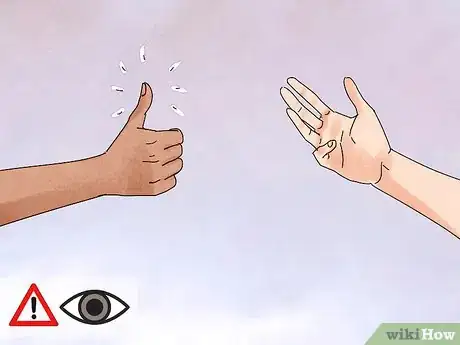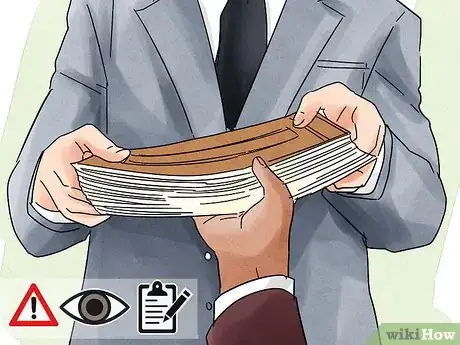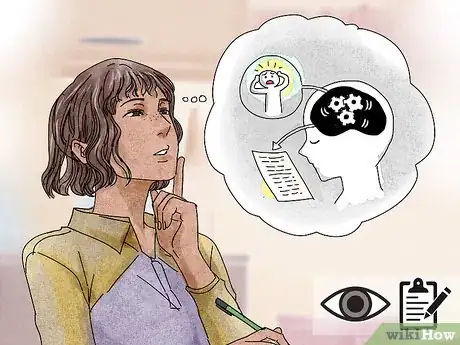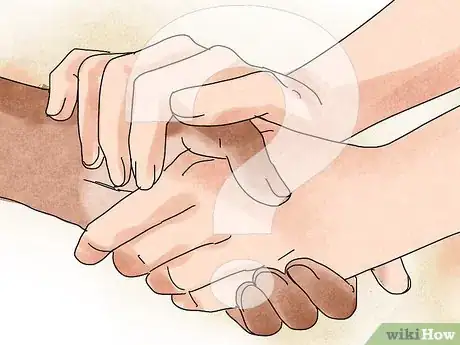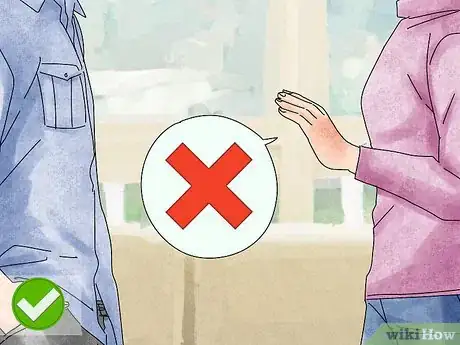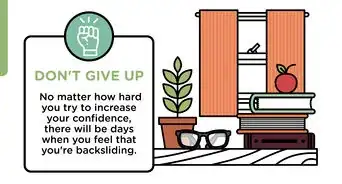This article was co-authored by Allison Broennimann, PhD. Dr. Allison Broennimann is a licensed Clinical Psychologist with a private practice based in the San Francisco Bay Area providing psychotherapy and neuropsychology services. With over a decade of experience, Dr. Broennimann specializes in in-depth psychotherapy to provide solution-focused treatments for anxiety, depression, relationship problems, grief, adjustment problems, traumatic stress, and phase-of-life transitions. And as part of her neuropsychology practice, she integrates depth psychotherapy and cognitive rehabilitation for those recovering after traumatic brain injury. Dr. Broennimann holds a BA in Psychology from the University of California, Santa Cruz, and an MS and Ph.D. in Clinical Psychology from Palo Alto University. She is licensed by the California Board of Psychology and is a member of the American Psychological Association.
This article has been viewed 20,679 times.
Being nice is an admirable quality, but some people can be too nice for their own good. People who are too nice may often put other people’s needs before their own, rarely say no when people make requests, and completely disregard their personal needs and desires. If you think that your niceness is having a negative effect on you, then you may be too nice. To determine if you are too nice for your own good, take a look at your behavior in your relationships, your thought patterns, and other factors, such as your stress levels and how you treat yourself on a daily basis.
Steps
Assessing Your Behavior in Relationships
-
1Pay attention to how often you say “yes” to requests. It is fine to be willing to help out your friends, family, and coworkers when you can, but problems may arise if you are always saying "yes" and never saying "no."[1] Think about how many times you have said yes when people ask you to do something for them. Do you ever say no?
- If you say yes most of the time, then you may be too compliant and people may even be taking advantage of your willingness to help all of the time.[2] This can be harmful to you since saying yes constantly can cut down on your free time and make it difficult to take care of the things that you need to.
- Try to practice saying no when you do not want to do something. You can simply say, "No." Or, you can say something like, "No, I can't do that."
-
2Make a list of how often you take on other people’s work for them. If a friend or coworker is overwhelmed, do you tend to offer to do things for them, or let them struggle through on their own? It is fine to offer your assistance now and then, but if you are regularly picking up the slack for someone, then they might be taking advantage of your kindness.[3]
- For example, if you have a friend who often puts off doing his homework, and you often end up completing it for him, then you are being too accommodating.
- The next time someone tries to get you to finish his or her work, try saying something like, “I am happy to help you out now and then, but I feel like I have been doing this more than I have the time or energy to. Have you talked to your parents/teacher/boss about the challenges you are facing with completing your work?”
Advertisement -
3Reflect on how often you apologize. People who are too nice are often people pleasers, and this can cause them to apologize profusely for their actions. It is normal to apologize when you are genuinely at fault for something. However, if you apologize constantly for minor offenses, or even just out of habit, then you may be too worried about other people’s reactions.[4]
- Before you apologize to someone, consider whether it is really necessary. Were you really at fault? Or are you just worried about how the other person might react?
- For example, if you are late for meeting a friend, then it is appropriate to say, “I’m sorry I was late.” However, you do not need to apologize 20 times for being a little late.
-
4Identify how often you put other people’s needs ahead of your needs. It is fine to think about other people and try to be kind to them. However, if you are always placing the needs of other people before you own, then you may be being too nice.[5] [6]
- For example, if a friend asks for your help moving into her new apartment, and you already have plans to go out of town with your boyfriend for the weekend, then you should not cancel your plans to accommodate your friend.
Considering Your Thoughts and Feelings
-
1Identify your motivation for doing what people want you to do.[7] If you often cave to people’s requests of you, then it might helpful to examine your motivations. Do you give in because you feel like other people’s needs are more important than your needs? Or do you give in because you feel that you do not deserve to enjoy yourself? Do you give in out of guilt?
- Either way, you may be disregarding your own needs and desires out of a sense that they are not as important as other people’s needs and desires.
- Try using a mantra to help you assert your own needs and desires. For example, you might simply tell yourself something like, "I matter, I have needs, and my time is important. It is okay to put myself first."
-
2Make a list of what frightens or worries you. You might better understand your behavior if you consider your fears and worries about saying no to people. Feeling frightened or worried that people will not like you or that they might reject you for not doing what they ask of you is a negative thought pattern that can drive you to do things that are uncomfortable for you.[8]
- The next time you are considering helping someone with a request, ask yourself if you are doing out of a genuine desire to help or out of fear or worry. If you are doing something out of fear or worry, then this may be a good time to take a step back and tell the person no.
- For example, if a friend asks you to go to a party with her and you do not want to go, but you are afraid that she might reject you if you don’t do it, then you would be acting out of fear of rejection if you agree to go.
-
3Identify ways that you judge yourself harshly. Judging yourself harshly can also cause you to be overly accommodating to other people.[9] Think about how often you are critical of yourself and how that may be affecting your behavior.
- For example, do you tend to think you are less intelligent than other people or less important? If so, then you may be giving in to other people’s requests out of a sense of inferiority.
- Try to identify these thoughts and challenge them as they occur. For example, you could reframe a thought like, “I am not very capable” to something like, “I have accomplished many things and I can do whatever I set my mind to do.”
-
4Note any feelings of resentment. Even if you are giving in to other people and doing nice things for them all of the time, you may not always have positive feelings towards them.[10] You might feel resent towards people for taking up your time and energy. However, you might not be expressing these feelings and they may be building up in the form of resentments, or pent up anger towards other people.
- Try to express these feelings to help you see when you have been too accommodating to someone. For example, you might say something like, “I wish I had not given up my evening plans to watch my sister’s children. I really needed that time to relax and I feel angry at her for asking me to give that up.”
- The next time someone asks you to do something that you don’t really want to do, consider whether it might lead to resentment. If the answer is yes, then you might want to say no.
Looking at Other Factors
-
1Note a tendency to avoid situations. If the thought of having to say no to someone or of being in a situation where you say yes out of guilt causes you to avoid some people and situations, then you might be too nice for your own good.
- For example, if you avoid going to an event at your child’s school because you know the teacher will ask you to help with something you don’t have time for, then your niceness is interfering with your life. It is important to learn how to be assertive and say “no” in these situations so that you can do the things you want to do.
-
2Ask yourself if people appreciate and reciprocate your efforts. Just because you are being nice to someone does not mean that he or she will return the favor. However, if people in your life have shown that they really appreciate your efforts and make a point of paying you back when they can, then this might be evidence of an equally kind relationship.[11]
- To determine if you are giving without receiving, look at how often people thank you or pay you back for all of the nice things you do for them.
- If a person does not thank you or pay you back in equal ways, then he or she may be taking advantage of your kindness. You may need to learn how to be more assertive with this person and say no to the next request.
-
3Pay attention to your energy levels. Low energy can indicate that you are doing too much, which is a common problem with people who are too nice. You might be saying yes to every request you get and doing more than you have the time or energy to do.[12]
- If you often feel tired and drained of energy, think about what your schedule is like. Are you often running around and doing things for other people? If so, then it might be time to cut back on these favors and give yourself some rest.
- Try saying something like, “I can’t continue to help you in this way. It is wearing me out and affecting other areas of my life.”
-
4Ask yourself if your stress is under control. Being accommodating to other people all of the time can take a toll on your stress levels as well.[13] If you often feel stressed out because of the things that you do for other people, then you might be going above and beyond in a bad way.
- Try using some relaxation techniques to get your stress under control, such as deep breathing exercises, meditation, or yoga.
- Doing things you enjoy can also help to get your stress back under control, such as exercising, making time for a favorite hobby, or listening to music.
-
5Determine if you are nice to yourself. You might be incredibly kind to other people, but not so nice to yourself.[14] You might berate yourself, discount your needs, and wear yourself down physically. Try to start being nicer to yourself, such as by doing things like:
- Setting healthy boundaries.
- Making sure you get enough sleep.
- Preparing healthy meals for yourself.
- Giving yourself enough time to groom yourself.
- Dressing yourself in clothes that fit you well and make you feel good.
- Saying nice things to yourself rather than beating yourself up for mistakes.
-
6Remind yourself that it is okay to say no. A big part of being too nice to other people is never saying “no” when they ask you to do things for them. Doing this shows that you place more importance on other people’s needs than your own needs.[15] To change this pattern, try to get into the habit of putting yourself first and saying “no” more often.[16]
- The next time someone asks you to do something that you do not want to do or don’t have time to do, try saying something like, “No. I can’t help you with that.” Or you can say, “No. I don’t have time to do that.”
- Keep it simple when you say "no" and don't make excuses for why you are saying "no." You have the right to tell people "no" and you don't have to explain yourself.
- To feel comfortable saying “no” to people, you may also need to work on being more assertive. You can learn these skills with some time and effort.
References
- ↑ https://www.psychologytoday.com/blog/communication-success/201309/are-you-too-nice-7-ways-gain-appreciation-respect
- ↑ Allison Broennimann, PhD. Clinical Psychologist. Expert Interview. 29 January 2021.
- ↑ https://www.psychologytoday.com/blog/communication-success/201309/are-you-too-nice-7-ways-gain-appreciation-respect
- ↑ http://psychcentral.com/lib/21-tips-to-stop-being-a-people-pleaser/?all=1
- ↑ Allison Broennimann, PhD. Clinical Psychologist. Expert Interview. 29 January 2021.
- ↑ https://www.psychologytoday.com/blog/communication-success/201309/are-you-too-nice-7-ways-gain-appreciation-respect
- ↑ http://blogs.psychcentral.com/imperfect/2016/07/12-signs-that-youre-a-people-pleaser/
- ↑ http://blogs.psychcentral.com/imperfect/2016/07/12-signs-that-youre-a-people-pleaser/
- ↑ http://blogs.psychcentral.com/imperfect/2016/07/12-signs-that-youre-a-people-pleaser/
- ↑ http://blogs.psychcentral.com/imperfect/2016/07/12-signs-that-youre-a-people-pleaser/
- ↑ https://www.psychologytoday.com/blog/communication-success/201309/are-you-too-nice-7-ways-gain-appreciation-respect
- ↑ http://blogs.psychcentral.com/imperfect/2016/07/12-signs-that-youre-a-people-pleaser/
- ↑ https://www.psychologytoday.com/blog/lifetime-connections/201508/6-questions-ask-yourself-when-you-are-let-down-others?collection=1085135
- ↑ http://psychcentral.com/lib/21-tips-to-stop-being-a-people-pleaser/?all=1
- ↑ Allison Broennimann, PhD. Clinical Psychologist. Expert Interview. 29 January 2021.
- ↑ http://psychcentral.com/lib/21-tips-to-stop-being-a-people-pleaser/?all=1
